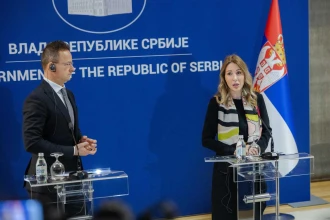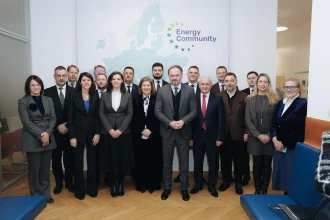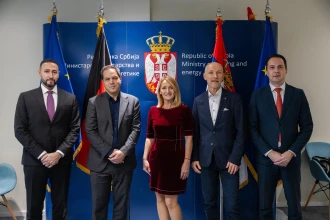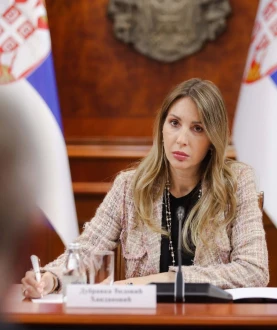At the start of the public consultation on the Draft Decree on the Determination of the Integrated National Energy and Climate Plan (INECP) of the Republic of Serbia until 2030, with a vision until 2050 held today Minister of Mining and Energy, Dubravka Djedović, said that this document is setting the targets for the energy sector of Serbia in the coming decades, in order to ensure secure supply, energy independence and efficient and economical management of the decarbonisation process.
Đedović at the opening of the public consultation on the Integrated National Energy and Climate Plan of the Republic of Serbia
The Minister pointed out that the achievement of the INECP targets will contribute to a healthier environment, improved security of supply and greater availability of energy to customers including more green energy. "Our key goals include increasing the share of RES in electricity production to 45 percent, significantly increasing energy efficiency, and reducing GHG emissions by 40.4 percent until 2030 compared to 1990." Achieving these goals also implies the construction of new production capacities, including solar and wind power plants with a total capacity of 3.4 GW, as well as a new gas-fired power plant with a capacity of 350 MW," she said.
As she stated, the total investment needs covered by in the WAM scenario that takes into account additional measures amount to approximately EUR 10.72 billion for the public sector until 2030, and the cumulative investment needs amount to EUR 27.41 billion until 2030.
"Achieving the targets set by the INECP is supposed to generate multiple benefits to our people and the economy by increasing the GDP, creating new business opportunities for Serbian companies and creating new jobs, ensuring the security of supply and availability of energy to customers including more green energy and modernization of the energy sector in accordance with European standards," Djedović said.
She pointed out that the integrated plan is one of the most important strategic documents that defines the process of energy transition in Serbia and that by implementing the process of public consultations which will last until July 27, the Ministry wants to hear opinions, suggestions and proposals that would contribute to getting a top quality plan in the end.. "We expect to adopt the Integrated Plan in the fall. Simultaneously, we are working on the preparation of the new Energy Sector Development Strategy," the Minister added.
Djedović emphasized that the support of the EU and financial institutions is necessary for the energy transition process in Serbia in order for this process to be financially sustainable and socially just. "Obviously, no country that has relied on coal for decades, not even Serbia, can wave a magic wand in order to change its energy mix overnight. In addition, although we strive for the same goals as the EU countries, the fact is that we do not have the same starting positions, neither in terms of energy nor financially. For decarbonisation and a successful green transition, it is very important that we obtain, as it is the case with EU members, a strong and continued support from international partners and financial institutions, in order to be able to implement this process in a financially sustainable and socially just way," said the Minister.
She said that by adopting an ambitious but realistic plan for the energy transition, Serbia has demonstrated that it is ready to work on increasing energy security and independence, as well as on fulfilling international obligations regarding the implementation of the global climate agenda. "We are following the European vision in the field of energy, in accordance with our level of development and available resources, bearing in mind the reality we live in and the future we strive for," Djedović stated.


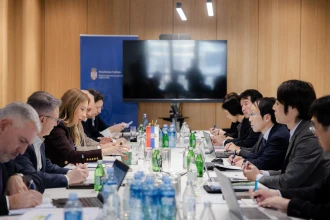
.webp)
